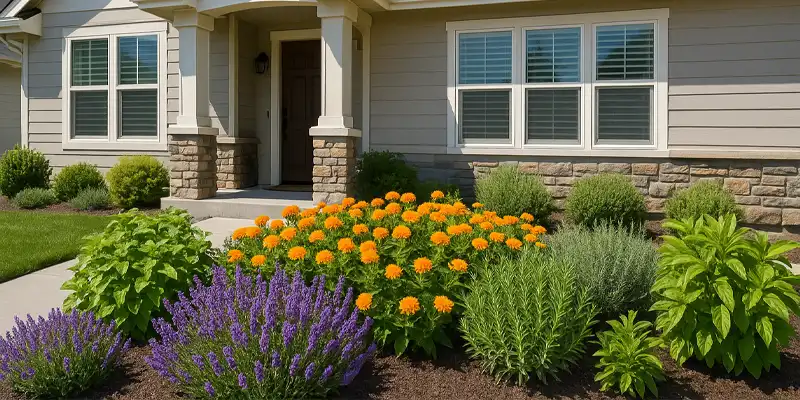
Key Takeaways
Summary
- Pest-repelling plants such as lavender, marigolds, and mint can support a healthier ecosystem.
- Strategic pruning and plant selection will block pest entry without sacrificing appearance.
- Hardscape features such as gravel strips and raised beds discourage insects and rodents.
- Proper mulch, drainage, and lighting choices help to prevent infestations.
- Combining these methods with professional guidance offers long-term protection and peace of mind.
From trimming vegetation to creating physical barriers with hardscaping, there are many ways Meridian business owners can reduce pest habitats around their building. Work with a commercial pest control company in Meridian to help you achieve these goals.
Trim Vegetation
You may be inadvertently creating hiding spots for insects and rodents by having dense foliage and overgrown shrubs close to your building.
Tips for Vegetation Management
- Keep a clearance of at least 18 inches to two feet between landscaped plants and exterior walls.
- Regularly prune branches that touch the building or overhang walkways.
- Plant V-shaped shrubs, which reduce humidity at the base by allowing air to circulate.
Create Physical Barriers
A great way to deter pests is to incorporate hardscaping elements on your property, such as gravel borders, pavers, and raised planting beds.
Barrier Ideas
- Install a gravel strip around the building’s perimeter to keep ants, cockroaches, and rodents away. They tend to avoid unstable terrain.
- Choose paved patios, walkways, or gravel pads rather than organic mulch near your building because they don’t trap moisture or offer a convenient place to nest.
Try Pest-Deterring Plants
There are a few plant varieties that are known to naturally repel pests while enhancing your landscape:
Recommended Plants
- Lavender, mint, marigolds, rosemary, basil, and citronella: These plants keep mosquitoes, flies, and other insects away.
- Companion planting techniques such as chives, parsley, or mint: These help protect vulnerable areas while attracting beneficial predators.
- Plant strategically: Don’t place flowering, fruiting, or seed-bearing plants too close to entrances or foliage.
Manage Mulch and Moisture
Mulch is beneficial for plant health, but it can attract pests when placed too close to a building:
Mulching Guidelines
- Keep organic mulch at least six to 12 inches from foundation walls.
- Try cedar chips, rubber mulch, or gravel mulch, which are less hospitable.
- Mulch layers should be no thicker than two to three inches to prevent moisture accumulation and hiding spots.
Remove Standing Moisture
Stagnant water invites pest reproduction—especially mosquitoes, so be sure to improve drainage using landscape grading, French drains, or dry creek beds. You should also regularly clean or circulate water in ponds, fountains, and bird baths.
Attract Natural Pest Controllers
Natural predators are good for your landscape, so incorporate these features to attract them:
Ways to Attract Predators
- Attract insect-eating birds with birdhouses or bird baths.
- Install water features or plants that attract dragonflies.
- Support a balanced ecosystem with rock piles, layered plantings, and native species.
Why Meridian Businesses Need Thoughtful Landscaping
Landscaping goes well beyond beauty and curb appeal. When done thoughtfully, pest-conscious landscaping can protect your commercial property, reduce maintenance costs, and minimize the need for harsh chemicals. From smart plant choices to water management, you can foster a resilient business landscape that naturally resists pests.
Contact Eco Pest Control
We can help you implement long-term, effective pest control solutions for your Meridian business. Contact us today at 208-600-8734 for a free quote and inspection.



